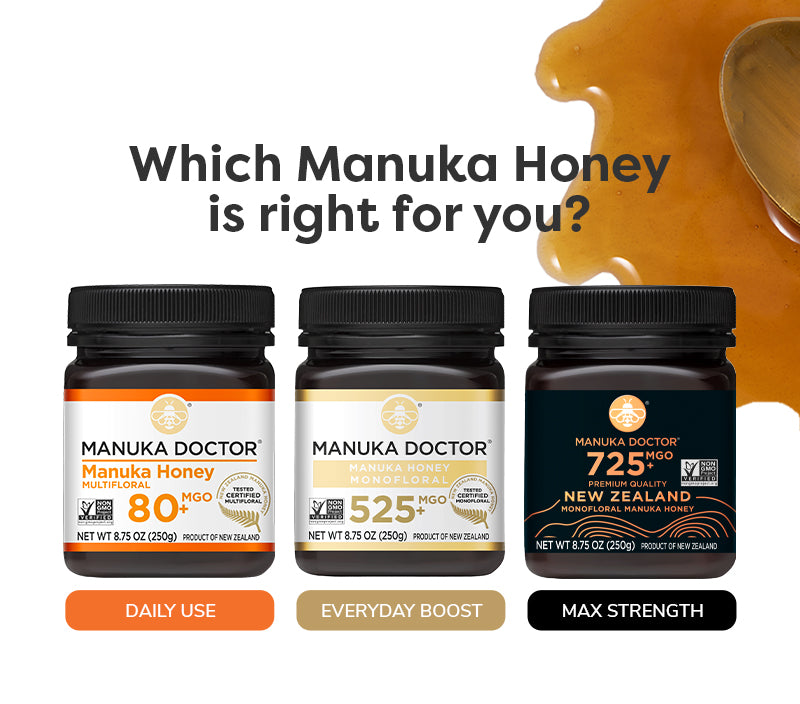Manuka Honey
The Doctor Is In. Every Jar. ONE POT, THREE BENEFITS: Strengthens Immunity + Improves Digestion + Boosts Energy. Upgrade to a honey with purpose.
Certified as Genuine Manuka Honey by the New Zealand Government. Every pot is harvested and packed in New Zealand.
 25% off
25% off
Mānuka honey
1025 MGO Manuka Honey 8.75 ozThis special grade is our highest MGO rating available in the USA
$82.49 was $109.99

Mānuka honey
825 MGO Manuka Honey 8.75 ozMax strength Manuka. Every pot packed in New Zealand
$79.99
 25% off
25% off
Mānuka honey
625 MGO Manuka Honey 8.75 ozFully traceable Manuka Honey. Max strength rating
$50.99 was $67.99
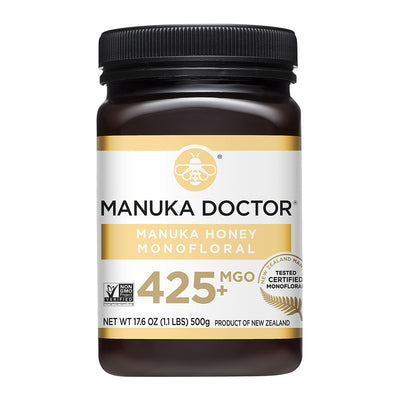
Mānuka honey
425 MGO Manuka Honey 1.1lbCertified Monofloral Manuka Honey. Every pot is packed in New Zealand
$102.99
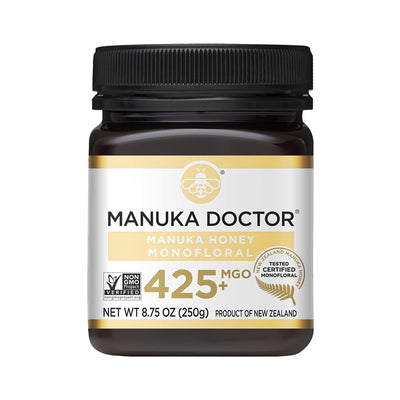
Mānuka honey
425 MGO Manuka Honey 8.75 ozA higher grade Monofloral Manuka Honey with higher MGO
$53.99
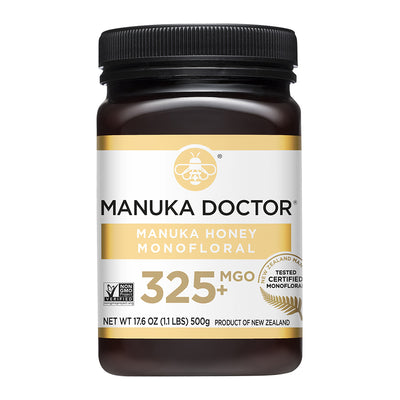 50% off
50% off
Mānuka honey
325 MGO Manuka Honey 1.1lbCertified Monofloral Manuka Honey. Every pot is packed in New Zealand
$41.99 was $83.99
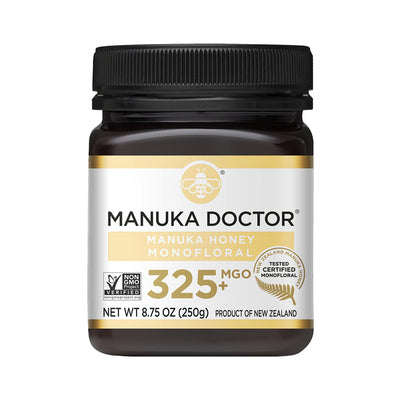
Mānuka honey
325 MGO Manuka Honey 8.75 ozA higher grade Monofloral Manuka Honey with higher MGO
$43.99
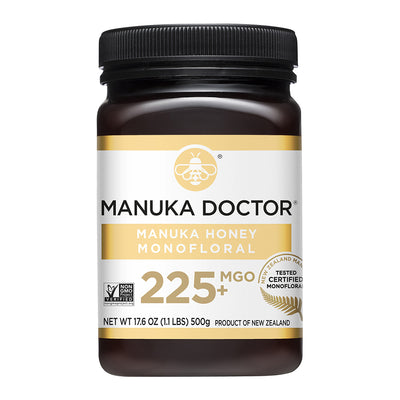
Mānuka honey
225 MGO Manuka Honey 1.1lbCertified Monofloral Manuka Honey. Every pot is packed in New Zealand
$69.99
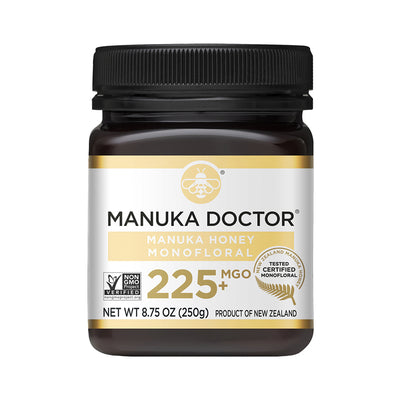
Mānuka honey
225 MGO Manuka Honey 8.75 ozA higher grade Monofloral Manuka Honey with higher MGO
$36.99
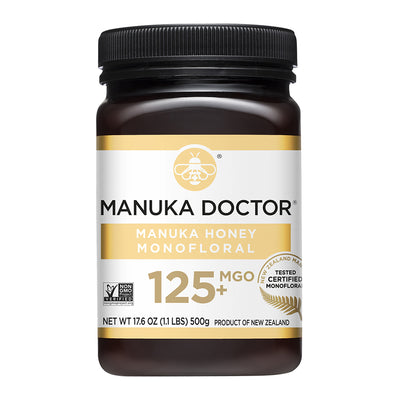
Mānuka honey
125 MGO Manuka Honey 1.1lbCertified Monofloral Manuka Honey. Every pot is packed in New Zealand
$57.99
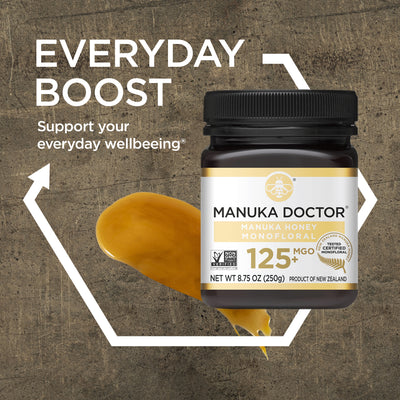
Mānuka honey
125 MGO Manuka Honey 8.75 ozA higher grade Monofloral Manuka Honey with higher MGO
$29.99
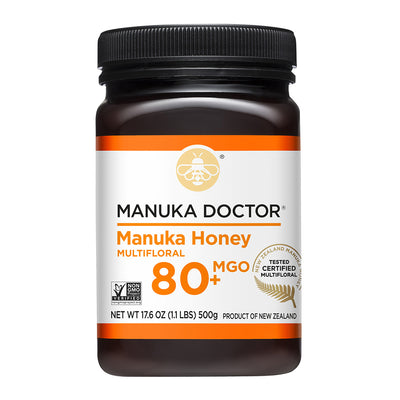
Mānuka honey
80 MGO Manuka Honey 1.1lbA great tasting Multifloral Manuka Honey for your daily dose of Manuka
$43.99
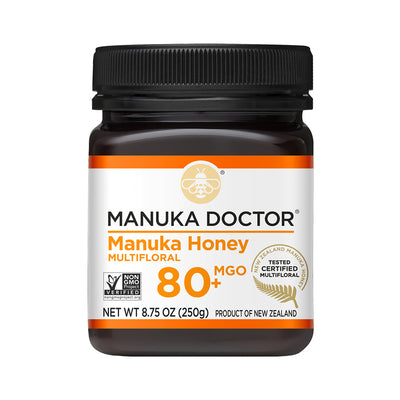
Mānuka honey
80 MGO Manuka Honey 8.75ozA great tasting Multifloral Manuka Honey for your daily dose of Manuka
$22.99
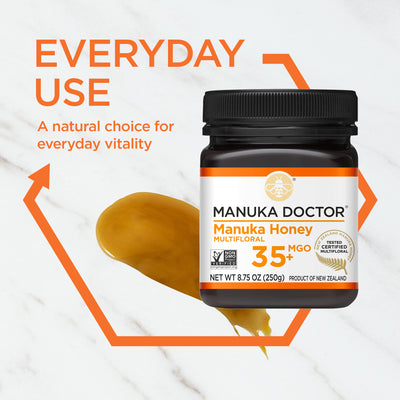 20% off
20% off
Mānuka honey
35 MGO Manuka Honey 8.75ozA great tasting Multifloral Manuka Honey for your daily dose of Manuka
$11.99 was $14.99
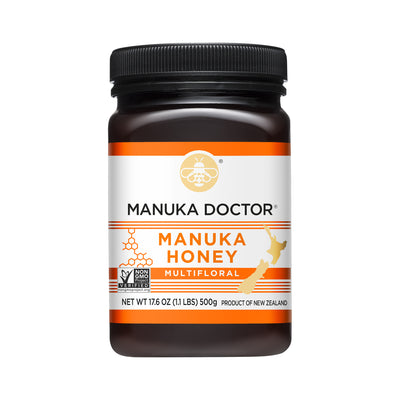 50% off
50% off
Mānuka honey
Multifloral Manuka Honey 500g$12.49 was $24.99
 50% off
50% off
Mānuka honey
182 MGO/ UMF 8+ Squeezable Manuka Honey 10.58 ozA higher grade Monofloral Manuka Honey with higher MGO
$15.49 was $30.99
Choosing Mānuka Honey
What is unique about New Zealand Manuka Honey?
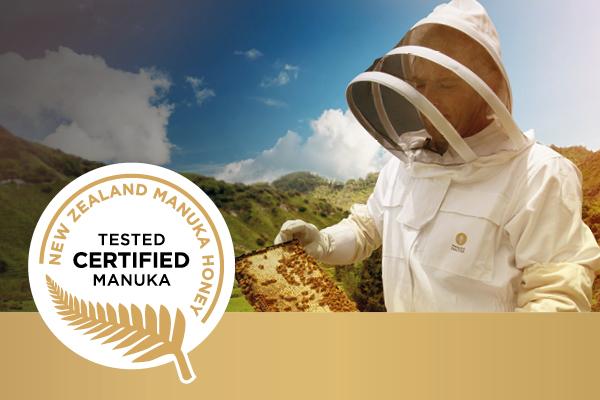
All Manuka Honey exported from New Zealand has to meet the strict requirements of the New Zealand Government to ensure it is genuine. Government scientists have identified four chemicals and a DNA marker which are unique to New Zealand Manuka Honey [1] – and each batch must be tested to ensure it contains certain levels of these five elements before it can be sold to our customers [2].
At Manuka Doctor, we put this Government Standard on the lid of every jar when it is packed in New Zealand so you can be confident you are buying a genuine, authentic Manuka Honey, that has been created at source and shipped to the USA in the same jar.
1. McDonald C M, Keeling Z E, et al. Using chemical and DNA marker analysis to authenticate a high-value food, manuka honey. npj Science of Food. 2018;2:9. https://www.nature.com/articles/s41538-018-0016-6
2. Ministry for Primary Industries. Manuka Honey. https://www.mpi.govt.nz/growing-and-harvesting/honey-and-bees/manuka-honey/
Why should I always buy 100% New Zealand Manuka Honey?
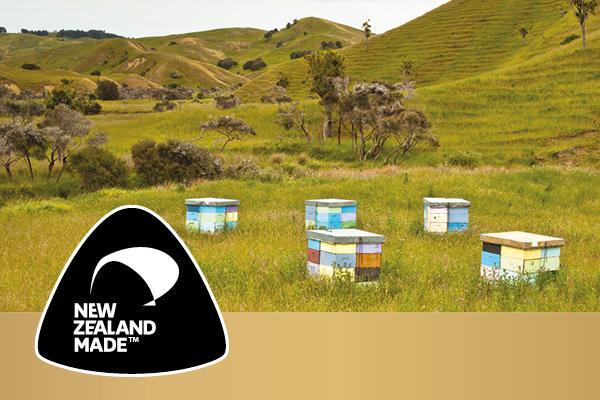
Sadly like many expensive and rare products, Manuka Honey is also subject to copies and passing off.
Some dishonest companies have been caught either diluting their Manuka Honey with cheaper European honey outside of New Zealand, or artificially adding chemicals to make their Manuka appear stronger than it once was.
We are in support of the New Zealand Government’s MPI standard of Manuka, and all of our products are packed in New Zealand itself, meaning once the jars are sealed there is no change to your product from New Zealand to your home.
Remember to look for "packed in New Zealand" on the label, and buy from a trusted brand who tests its products before sale.
Finally, we have created this blog post, titled "Five ways to check your Mānuka isn’t fake" to help customers ensure they are buying only genuine Manuka honey, packed in New Zealand, that passes the stringent NZ Government tests.
Trusted and Traceable from hive to home
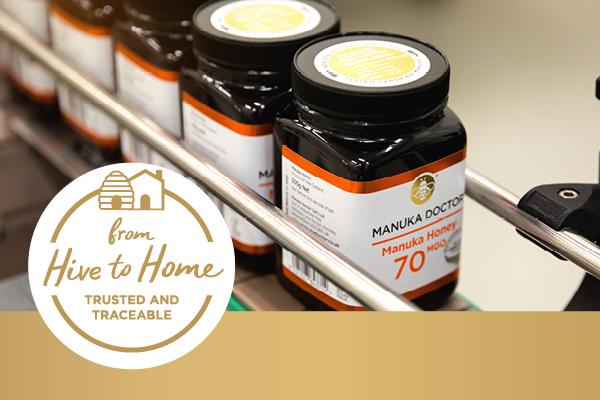
Manuka Doctor is a privately owned family company based in Auckland, New Zealand with origins that can be traced back to 1901. We are one of the main exporters of genuine Manuka Honey from New Zealand and the Manuka Doctor brand is sold across the world.
Manuka Doctor is proud to be a New Zealand owned company that oversees 60,000 individual bee hives in the North and South islands, spanning over 11,000 hectares of land, all owned by our founder.
This means that we can trace every single batch of honey right back to the hive site where it was created.
And after laboratory testing to ensure purity and strength, we pack every pot of Manuka Honey in New Zealand itself before products are exported.
We call this unique supply chain trusted and traceable from Hive to home. Learn more about where Manuka Honey comes from here.
What does MGO mean in Manuka Honey?
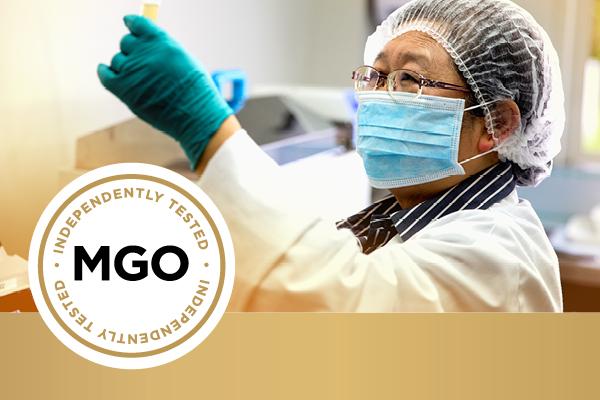
The number on the front of the pot represents the mg per kg of MGO (Methylglyoxal) and the related strength of Antimicrobial Activity, which is known to kill certain types of bacteria. The greater the number, the stronger the Antimicrobial Activity.
MGO is related to the strength of the Manuka Honey. The strength of Manuka Doctor honey is measured using the MGO grading system from 35 MGO to 925 MGO. Scientists generally agree that MGO is the best way to establish a honey’s antimicrobial (bacteria killing) strength.
So put simply, the MGO number refers to the amount of methylglyoxal per kilogram. For example Manuka Doctor 525 MGO has 525mg per kg of MGO in the pot.
What is Methylglyoxal in Honey? MGO in Manuka Honey is derived from dihydroxyacetone (DHA) which is naturally present in the nectar of the Manuka Bush. Within the hive DHA undergoes the Maillard reaction to form MGO, a process which is driven by the higher temperatures found within bee hives.
What MGO level do I need? Click here for a guide on our Mānuka Honey strengths and help on deciding which Mānuka Honey to buy.
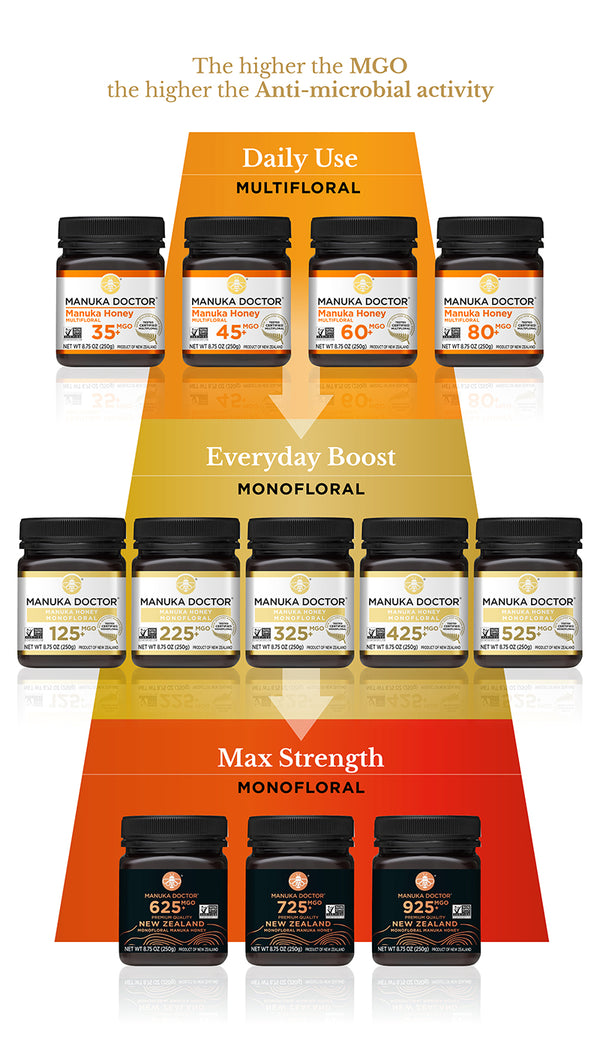
What's so special about Manuka Honey?
Manuka Honey is special because its antimicrobial properties come from non-peroxide activity. Research shows this activity, which is unique to Manuka Honey, has "significant antibacterial effects" [1].
The now world famous Manuka Honey is only made by bees who collect nectar from the Manuka bush, a wild shrub which grows widely across New Zealand but flowers for only a few weeks a year.
Manuka Honey has "antibacterial and antioxidant properties" which have been linked with a range of wellbeing benefits according to scientific journals [2].
Parts of the Manuka bush were used for centuries by New Zealand's native Maoris as a herbal medicine to treat conditions like fevers and dandruff [3]. While honey has been used widely since ancient times to help wounds heal [1], it was not until European settlers introduced the European honey bee in the first half of the 19th century that both Maori and settlers started using the honey to help with wellbeing.
You can read more about what's special about Mānuka Honey here.
1. Mandal MD, Mandal S. Honey: its medicinal property and antibacterial activity. Asian Pac J Trop Biomed. 2011;1(2):154-60. https://www.ncbi.nlm.nih.gov/pmc/articles/PMC3609166/
2. Patel S, Cichello S. Manuka honey: an emerging natural food with medicinal use. Nat Prod Bioprospect. 2013;3(4):121–128. doi:10.1007/s13659-013-0018-7
3. Jones R, Rongoā – medicinal use of plants, TEARA: The Encyclopaedia of New Zealand https://teara.govt.nz/en/rongoa-medicinal-use-of-plants
What is multi and mono floral?
Under New Zealand law there are two classifications of Manuka Honey.
MULTIFORAL Manuka means bees visited the Manuka bush as well as other floral sources near to the hive to produce the honey. To be classified as Multifloral, the honey must contain ‘wholly or mainly’ Manuka nectar above any other source plus meet four naturally occurring markers and a pollen test. Our Multifloral Manuka Honey has an MGO of between 30 and 70.
MONOFLORAL Manuka Honey is produced by bees who predominantly collected nectar from the Manuka bush itself. To be called Monofloral, the honey must meet a higher level of two of the four naturally occurring markers and meet the pollen test. Some batches of Monofloral Manuka Honey from the most remote regions of New Zealand can have an MGO rating of 840, making it extremely rare and special find.
I have bought Manuka Honey from a supermarket before and it is measured using a different number, which MGO level is comparable?
Some brands use different grading systems where several chemical markers are combined to give a new number, for example 15+. Often the amount of MGO is a factor in determining these rankings.
We have created a simple comparison check, where you can see at a glance the MGO level you need, if you have previously buying Manuka rated on a different scale.
You can view our comparison table between MGO and UMF activity ratings here.
When shopping for your Manuka Honey look for the 'New Zealand Made' logo on the side of the pot.
What is antimicrobial activity and why is it a good thing?
An antimicrobial is an agent that kills micro-organisms or stops their growth.
The primary difference between antibacterial and antimicrobial substances is the types of micro-organism they act upon. While antibacterial products prevent the development of bacteria, Antimicrobial products have the ability to kill or slow the spread of microorganisms, which may include bacteria, parasites, or fungis.
Merilyn Manley-Harris, associate professor of organic and analytical chemistry at the University of Waikato, New Zealand, says: "MGO is an antibacterial agent and research shows it is very difficult for bacteria to develop immunity to it because it has multiple methods of action.
"The slightly bitter taste of Manuka Honey is because it’s also quite high in phenolic acids, which are antioxidants."
A genuine New Zealand brand
New Zealand FernMark Licence Programme. Licence No. 100241
The Silver Fern is one of New Zealand's most recognised, long-standing, and respected national symbols. To carry the FernMark logo, a business needs to show that they reflect the essence of the country by being registered in New Zealand, compliant with all New Zealand laws and relevant regulations and have a substantial level of New Zealand ownership, governance and full time employees. We are proud to say Manuka Doctor meets all of these criteria to be a registered FernMark brand that you can trust.


